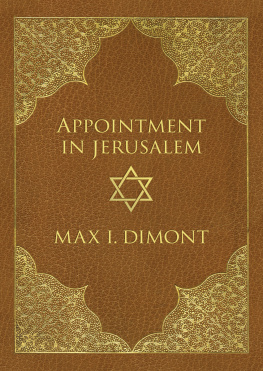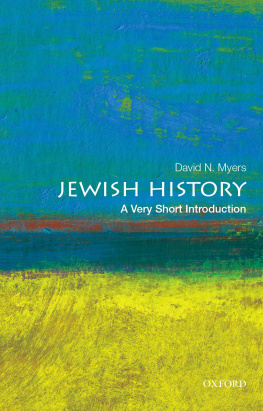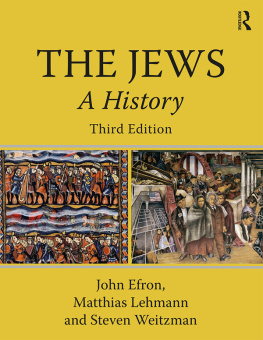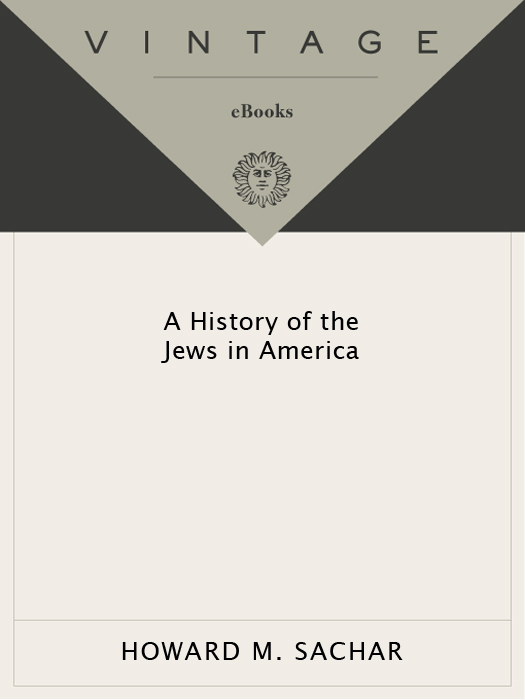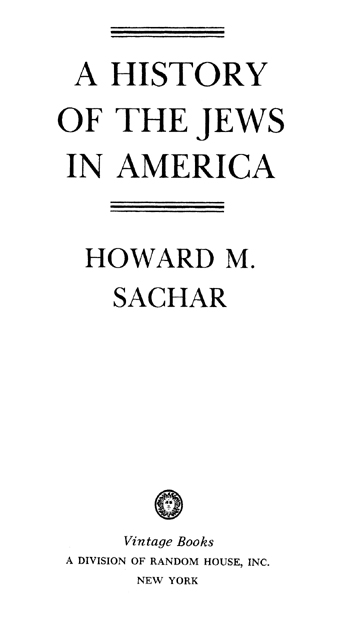Acclaim for
HOWARD M. SACHARS
A History of the Jews in America
Now, finally, the book Iand with me undoubtedly many othershad been waiting for has at long last been produced. It is Howard Sachars A History of the Jews in America. Sachars mastery as a historian has been amply demonstrated by his previous works on the history of modern Israel and the contemporary Middle East. In the present book, it has reached a new peak.
Raphael Patai, Midstream
Howard M. Sachar is one of the leading historians of the Jews in the contemporary era, and his new book on the history of the Jews in America clearly will add to this reputation. There have been previous attempts to write a one-volume history of American Jewry, but no one has treated the source material with such interpretive force.
Jerusalem Post
A historian of exceptional talent and nerve Mr. Sachars splendid gifts have not deserted him in this huge work, which is likely to be remembered as his magnum opus. Here is the American Jewish experience in all its dazzling diversity Splendidly accessible.
Washington Times
With this comprehensive, insightful, and spirited opus, Sachar rises to the position of preeminent Jewish historian of our day. This immensely readable tome offers several centuries worth of crystallized energy.
Kirkus Reviews
The most comprehensive single volume as yet written on the subject A signal achievement furnishing a valuable aperu for scholars and an abundance of historical insights for lay readers.
Library Journal
An immense and impressive orchestration of scholarship and story letting An impressive, frank, and learned social history of a people who are simultaneously unique and archetypical of the human condition.
Book List
ALSO BY HOWARD M. SACHAR
The Course of Modern Jewish History
Aliyah: The Peoples of Israel
From the Ends of the Earth: The Peoples of Israel
The Emergence of the Middle East
Europe Leaves the Middle East
A History of Israel: From the Rise of Zionism to Our Time
The Man on the Camel
Egypt and Israel
Diaspora
A History of Israel: From the Aftermath of The Yom Kippur War
FIRST VINTAGE BOOKS EDITION, NOVEMBER 1993
Copyright1992 by Howard M. Sachar
All rights reserved under International and Pan-American Copyright Conventions. Published in the United States by Vintage Books, a division of Random House, Inc., New York, and simultaneously in Canada by Random House of Canada Limited, Toronto. Originally published in hardcover by Alfred A. Knopf, Inc., New York, in 1992.
Grateful acknowledgment is made to the following for permission to reprint previously published material:
American Jewish Archives: Excerpts from Two Presidents and a Haberdasher1948, April 1968; and excerpts from A Tragic Voyage by Lena Pearlstein Berkman, April 1979. Reprinted by permission of American Jewish Archives.
American Jewish Historical Society: Excerpt from German Jews in White Labor Servitude by Guido Kisch, American Jewish Historical Quarterly; excerpt from Desertion in the American Jewish Immigrant Family by Ari Friedkis, American Jewish History (Dec. 1981). Reprinted by permission of the American Jewish Historical Society.
Farrar, Straus & Giroux, Inc.: Excerpt from A Segment of My Times by Joseph Proskauer. Reprinted by permission of Farrar, Straus & Giroux, Inc. Harvard University Press: Translation of Upheaval and Efflux in Central Europe from Germany and the Emigration 18161885 by Mack Walker. Copyright 1964 by the President and Fellows of Harvard College. Reprinted by permission of Harvard University Press, Cambridge, Mass. International Creative Management, Inc.: Excerpt from Poor Cousins by Ande Manners. Copyright 1968 by Coward McCann & Geoghegan. Reprinted by permission of International Creative Management, Inc.
Jewish Publication Society: Excerpts from Memories of American Jews, 17751865 by Jacob R. Marcus, Vol. I and Vol. II, Philadelphia, 1955. Reprinted by permission of the Jewish Publication Society.
Jewish Social Studies: Excerpt from Isaac Mayer Wise: A New Approach by Aryeh Rubinstein, Jewish Social Studies, WinterSpring, 1977. Reprinted by permission of Jewish Social Studies.
KTAV Publishing House, Inc.: Excerpts from poems by G. Zelicovich; Morris Rosenfeld; David Edelstadt; and Yosef Bovshover from Jewish Labor in the United States, 2nd ed., Vol. 1, KTAV, 1969. Reprinted by permission of KTAV Publishing House, Inc.
Library of Congress Cataloging-in-Publication Data
Sachar, Howard Morley, 1928
A history of the Jews in America / Howard M. Sachar. 1st
Vintage Books ed.
p. cm.
Reprint. Originally published: New York: Knopf, C1992.
Includes bibliographical references.
eISBN: 978-0-8041-5052-1
1. JewsUnited StatesHistory. 2. JudaismUnited StatesHistory.
3. United StatesEthnic relations. I. Title.
[E184.J5S23 1993]
97304924dc20 9250612
v3.1
For Abram Leon Sachar
who has profoundly shaped the course of this history
Contents
Prologue

O N MAY 4, 1865, Morris and Katherine Myers and their four young children traveled by horse and wagon from Athens, Illinois, to neighboring Springfield. The wagon contained the familys entire worldly goodstheir clothing, bedding, furniture, and kitchen utensils. It was a decisive turning point in Morris Myerss odyssey. He was about to go into business for himself. Son of a family of Jewish cattle dealers from Holsdorf, a German town near Frankfurt, he had immigrated to the United States only fourteen years earlier, as a youthful bachelor. The Salzensteins, family friends from the Old Country, had promised him employment in their little general store in Athens. From 1851 onward, Morris Myers had worked for the Salzensteins, first as a sales clerk, then as a customer-peddler to surrounding farms. He had done well enough to win the hand of Katherine Hahn, daughter of a Cincinnati Jewish family, and now at last to purchase his own mens-clothing store in Springfield. It was a promising opportunity. Capital of Sangamon County, Springfield not long before also had become the capital of Illinois. Business was certain to be good. In anticipation of the move, Morris Myers already had purchased a small home in one of Springfields more respectable neighborhoods. And there, this May 4, 1865, the impatient new proprietor directed his team of horses.
Yet no sooner had the family reached the town center, with its looming state capitol rotunda, than they found the way blocked. Tens of thousands of persons crowded the streets. By horse and by foot, alone or in families, they moved in silence behind a full regiment of mounted cavalry. The Myerses then joined the procession. Unknowingly, they had entered Springfield on the day of Abraham Lincolns burial. The funeral train had spent twelve days carrying the presidents body from Washington, stopping periodically for religious ceremonies in selected towns during the 1,700-mile trip. On board too were the remains of the Lincolns son Willie, who had died in 1862. Once the train reached Springfield, Lincolns body lay in state throughout the day and night at the capitol building. It was this morning of May 4 that the long funeral procession journeyed at last to Oak Ridge Cemetery. After a final hymn and a rifle volley under lowering skies, the military guard of honor placed Lincolns casket in the cemeterys public receiving vault next to Willies. The Myers children witnessed the event. For them and their neighbors and their descendants, Lincoln would never cease to be a brooding presence.


